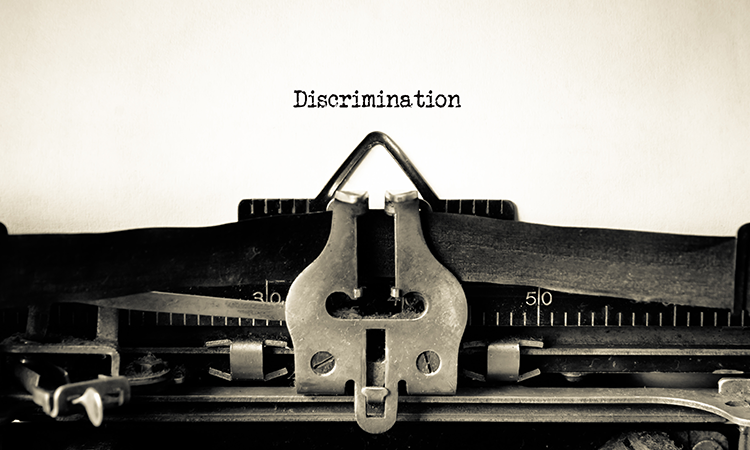LGBTQ+ lawyers and attorneys with disabilities report prevalent discrimination, ABA study says

Image from Shutterstock.com.
Nearly 40% of lawyers who identify as having disabilities and/or as LGBTQ+ report experiencing discrimination, harassment and bias in the workplace, according to a new national study by the ABA and Burton Blatt Institute at Syracuse University.
Of these lawyers, nearly 22% say they experienced subtle and intentional biases, while nearly 39% say they perceived or experienced subtle but unintentional biases, the study, Diversity and Inclusion in the American Legal Profession: First Phase Findings from a National Study of Lawyers with Disabilities and Lawyers Who Identify as LGBTQ+, reported Tuesday.
“This study is an important first step in working towards a more inclusive and better legal profession by identifying bias and stigmas against LGBTQ+ lawyers as well as lawyers with disabilities,” ABA President Judy Perry Martinez said in a news release. “The ABA remains committed to its core goal of eliminating bias and enhancing diversity. Discrimination against people with disabilities and LGBTQ+ individuals, whether structural or unintentional, needs to be eradicated.”
The ABA and Burton Blatt Institute invited nearly 200,000 lawyers that were identified through national organizations of people with disabilities and people in the LGBTQ+ community, state and regional bar associations, law firms, the judiciary and legal academics to participate in an online survey about their experiences in the legal profession.
The study of 3,590 respondents from each state and the District of Columbia focused not only on lawyers who report having health conditions, impairments and disabilities and lawyers who identify as LGBTQ+, but also on the intersection of these identities.
“A number of prior efforts in the legal profession have focused on diversity and inclusion (“D&I”), as has this study,” according to the report. “But these studies have examined (largely) visible social identities, such as race, ethnicity, gender, age, and others that are readily apparent.
“Relatively less information is available on the experiences of the people examined here—people with mixed-visible and nonvisible identities such as LGBTQ+ and having a disability.”
One in six of the study’s respondents say they identify as lesbian, gay or bisexual, which the study refers to as “LGB.” One-quarter report a health impairment, condition or disability. Almost one-third of lawyers who opted to provide further information report a mental condition, which could include depression, anxiety, learning disabilities, attention deficit hyperactivity disorder, autism and sleep disorders.
According to the study, of the respondents who report disability and health issues, nearly 19% identify as LGB. Nearly 54% identify as women, about 45% identify as men and 1.4% report other gender identities.
“Other studies have found that disability prevalence rates are higher for people who identify as LGBTQ+ than for those who identify as straight and cisgender,” the report says. “About 1.0% (32 people) of the sample reported gender identities such as transgender, non-binary, non-binary-non-gender-conforming, genderfluid, gender non-conforming, androgynous, and agender.
“The trends suggest that further analysis may be fruitful as to the type of health and disability issues reported by persons with other minority identities.”
Sixteen percent of the study’s respondents who report experiencing discrimination, harassment and bias in the workplace indicate they experienced discrimination, while nearly 12% say they experienced harassment. Nearly 12% also say they experienced bullying.
“The most commonly selected form of bias was ‘subtle but unintentional bias,’ for example, for people with health conditions and impairments (33.1%), identifying with disabilities (29.9%), identifying as LGB (47.1%) and other gender identities (36.0%), and for minorities (38.0%) and women (38.2%),” according to the report.
The study detailed differences in the groups’ reporting of discrimination and bias in the workplace. For example, according to the report, “people with a health condition or impairment, and who identify as a person with a disability, reported experiencing proportionately more overt forms of discrimination, such as bullying and harassment, as compared to people who do not have such conditions.”
In comparison, about 47% of respondents who identify as LGB and 36% who identify with other gender identities report subtle but unintentional biases, the report says. “LGB respondents reported experiencing relatively less intentional bias, discrimination, and harassment as compared to other groups,” it continues.
The study also found that of the LGB respondents reporting a health condition, impairment or disability, about 60% say they experienced at least one incident of discrimination. Additionally, of the 67 women who identify as LGB with a health condition, about 52% report they experienced discrimination in their workplaces.
When asked about bias and discrimination mitigation strategies, one in five respondents say mentoring in their workplaces is effective, while about 18% say mentoring outside of their organizations is effective. The study shows that about 16% also note that membership in a specialized law network or support group is effective.
The ABA and Burton Blatt Institute refer to this study as the initial phase of a multi-phase longitudinal project. They plan to further examine “intersectional life identities reported in different contexts—for example, by firm type, size, venue and location, market sector, accommodation requests, and compensation,” as well as whether those who perceive bias and stigma file formal claims of discrimination.
“There remain uncounted diverse perspectives to hear and understand in the legal profession,” according to the report. “They are associated with individual job satisfaction, retention, and advancement, along with organizational success and sustainability.
“The longer-term objectives of this project are to measurably enhance the professional lives of lawyers and others engaged in the legal profession, and to mitigate pernicious sources of attitudinal stigma and structural bias in the profession.”
Write a letter to the editor, share a story tip or update, or report an error.


